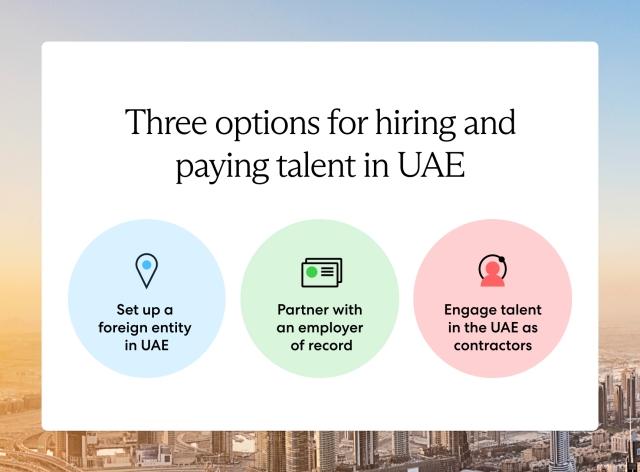Billing itself as a booming, multinational business hub, the United Arab Emirates (UAE) attracts highly skilled professionals worldwide, from India to the USA. Plus, the UAE welcomes foreign investment by offering low borrowing costs and free zones that grant businesses complete foreign ownership and tax exemptions.
Tapping into this market offers a world of opportunity for businesses in various sectors, from IT to natural resource extraction. However, navigating complex labor regulations, such as Emiratisation requirements and free zone employment laws, poses a unique risk to foreign employers.
Read this guide to learn everything you need to know about hiring talent in the UAE. Discover three options for compliantly engaging talent, a breakdown of UAE labor law, and a list of major compliance risks to know. Plus, find answers to commonly asked questions.
How can I hire an employee in the UAE?
Global companies can hire employees in the UAE by establishing a local business entity, partnering with an employer of record (EOR), or engaging local contractors. Each option offers unique advantages, from budgeting and flexibility to risk mitigation. The best approach for any business depends on its expansion goals.
3 options to hire talent in the UAE
As previously mentioned, global companies have three options for hiring talent in the UAE: establishing an Emirati business entity, partnering with an employer of record (EOR), or hiring local contractors.
While entity establishment offers long-term cost savings, some employers prefer the agility of partnering with an EOR or the low commitment of hiring contractors.
We discuss each approach in detail below, including their advantages and disadvantages.

1. Establish a legal entity in the UAE
The traditional approach to hiring talent in the UAE involves establishing a local Emirati business entity.
With a legal entity, you can reduce long-term hiring costs by engaging talent directly and handling the entire employment process internally, from hiring and onboarding to running payroll and administering benefits for your local team.
However, setting up a legal entity is time-consuming and costly. While entity establishment requirements vary between emirates, upfront expenses in most jurisdictions are around AED 50,000 (US$13,000), including trade name submission, licensing, and office fees. Plus, costs rise significantly after enlisting legal counsel.
While there is no minimum capital requirement for entity establishment in the UAE, most businesses need around AED 150,000 (US$40,839) to start. Plus, if you incorporate on the mainland, you’ll need a local sponsor to hold a 51% share in your company, indirectly impacting costs further.
This approach also leaves you fully responsible for compliance, exposing you to major risk as you navigate unfamiliar employment and tax regulations on your own. For instance, you’ll have to choose a trade name that complies with the UAE’s strict social and religious guidelines, ensure correct employee classification, and run compliant payroll for your local team.
Entity establishment only makes sense if you want to build a large foreign workforce and make long-term investments in the local market. Businesses that want a more agile and cost-effective option for quickly and compliantly hiring talent in the UAE should consider partnering with an employer of record (EOR) instead.
2. Partner with an employer of record in the UAE
Partnering with an employer of record (EOR) is the simplest way to quickly and compliantly hire talent in the UAE.
An EOR is a third-party entity with global infrastructure that can serve as the legal employer of your international workforce, making it easy to hire talent worldwide without setting up local entities or risking non-compliance.
With international legal expertise and a suite of workforce management solutions, an EOR mitigates risk while simplifying global HR on your behalf. They handle everything from hiring, onboarding, compliance, and immigration to running global payroll, administering global benefits, and offering ongoing HR support to your team in their native language. Meanwhile, you maintain your team’s day-to-day operations.
An EOR partner can also serve as an ideal bridge solution, allowing you to immediately hire local talent while undergoing lengthy incorporation and banking procedures.
By partnering with an EOR in the UAE, you can hire local talent within weeks instead of waiting months or years while remaining flexible and on budget as you expand.
Learn more: What Is an Employer of Record (EOR)?
3. Engage contractors in the UAE
An alternative to hiring full-time employees in the UAE is to engage local contractors. This approach offers global companies various benefits, from flexibility to cost savings.
By engaging contractors in the UAE, foreign employers can source highly skilled talent for one-off projects while saving time and resources they would otherwise spend hiring, onboarding, and paying a team of full-time employees.
While some companies succeed with large teams of contractors, remember that this route involves serious misclassification risk.
Worker classification refers to how you designate talent according to local regulations—as employees or contractors. Due to variations in classification laws worldwide, navigating worker designations abroad poses an added risk for any global company. Certain regulations in the UAE, such as the Emiratisation law, make it more critical than ever to accurately classify talent and ensure you’re meeting quotas.
Regulators in the UAE have established highly nuanced worker classification regulations to protect workers’ rights and prevent companies from hiring contractors for cost savings while treating them like employees.
Influencing certain aspects of your working relationship with a contractor, such as managing their work schedule or controlling who they subcontract with, may constitute an employment relationship under local regulations. If UAE labor officials classify your contractors as employees, your company can face back pay, tax arrears, fines, and other penalties.
Global companies engaging contractors in the UAE must conduct regular audits to stay abreast of evolving classification laws and ensure ongoing compliance.
Learn more: Employee Misclassification: Complete Guide
What to know before you hire talent in the UAE
Before hiring talent in the UAE, foreign employers must familiarize themselves with local labor, tax, and employment regulations, including UAE free zones, employment visa and permit requirements, and Emiratisation requirements.
We discuss each of these in detail below.
UAE free zones
Free zones are designated trade zones in the UAE designed to attract foreign business. The UAE has over 40 multidisciplinary free zones, including over 20 in Dubai alone.
When a foreign company operates in one of the UAE’s free zones, it enjoys unique benefits, such as 100% foreign national ownership with no local affiliation and 100% exemption from personal, import, and export taxes.
Other benefits include the following:
- 100% capital and profit repatriation
- 100% corporate and income tax exemption
- Streamlined access to regional and global markets
- Sophisticated and modern infrastructure
While employment laws in most free zones generally mirror UAE Labour Law, each zone implements unique regulations regarding employing foreign nationals, wages, health and safety, and contract termination.
Plus, each free zone only caters to specific industries. Take the Masdar Free City Zone and the Sharjah Publishing City, for instance. The Masdar Free City Zone accommodates companies in renewable energy, sustainability, healthcare, and community services.
Conversely, Sharjah Publishing City (SPC) facilitates entrepreneurship in the UAE by offering more than 1,500 business licenses, from publishing and printing to e-commerce and information technology (IT).
To do business in a free zone, an organization must complete the following steps:
- Choose a corporate structure
- Register a trade name
- Apply for a trade license and visa
- Purchase or rent office space
- Obtain pre-approvals
- Register the business with the local free zone authorities
Free zones are an attractive option for global companies looking to expand their operations into the Gulf region and hire talent in the UAE. The only drawback is that businesses registered in a free zone cannot do business outside that zone. However, if a company wants to extend its coverage to the mainland, it can apply for permission from its respective free zone authority.
UAE employment visa and permit requirements
Thanks to its simple visa requirements, the UAE is a haven for expats, or foreign nationals. In fact, expats constitute over 88% of the country’s population. As a result, many global companies operating in the UAE hire foreign nationals who need visas and permits to live and work there long term.
Many companies operating in the UAE also relocate domestic talent to the country as a part of their global mobility offering. In either case, if you employ foreign nationals in the UAE, you must provide them with visa sponsorship.
The UAE offers a standard work visa typically valid for two to three years. To obtain this visa, a foreign national must have an employment contract with a local employer, receive approval from the Ministry of Human Resources and Emiratisation (MoHRE), and acquire an entry permit.
Other work visas include the Green visa and Golden visa. UAE authorities created the Green visa to attract foreign freelancers and self-employed individuals. This visa allows holders to relocate relatives to the UAE and involves a simplified application process.
The Golden visa is a 10-year visa for professional specialists like doctors, research scientists, and engineers. In addition to offering long-term residency, this visa doesn’t require sponsorship and grants holders access to perks like exclusive healthcare packages.
Obtaining employment visas and work permits in the UAE can be complex and time-consuming, with delays often leading to operational disruptions and employee churn. One way to simplify immigration is to partner with a full-service immigration partner.
By offloading immigration to a professional partner, you can quickly and compliantly hire and relocate talent to the UAE without disrupting daily workflows or risking non-compliance.
Learn more: How to Get a UAE Work Visa: Step-by-Step Guide
UAE labor law
Companies that want to hire talent in the UAE must have a firm grasp of local labor laws to mitigate risk, ensure seamless growth, and avoid noncompliance penalties, such as fines and limited business opportunities.
While labor regulations vary between emirates and free zones, all jurisdictions share the following common elements:
- Employment contracts. UAE labor law requires employers and employees to enter into a written contract before an employee begins working. All employment contracts in the UAE must be fixed-term for up to three years and are extendable for the same duration.
- Leave entitlements. Once an employee has worked six months to a year in the same position, they are entitled to two paid days off per month. If they have worked more than one year, they are entitled to 30 paid days off annually.
- Working hours. A standard workweek in the UAE is 48 hours per week at eight hours per day; however, hours vary between industries and worker categories.
- Overtime. Employees who work overtime receive 125% of their standard wage. If they work overtime on nights and weekends, they receive 150%.
- Parental leave. Mothers are entitled to 60 days of paid maternity leave—they receive 100% pay for the first 45 days and 50% for the remaining 15 days. Fathers receive five days.
- Termination. Unless an employee or employer performs gross misconduct or fails to meet their legal obligations under their work contract, the notice period for both parties is 30 to 90 days, depending on the employee’s length of service.
- Severance. Employers must pay severance according to the employee’s length of service—21 days of wages for each year of service for the first five years and 30 days for each following year.
UAE taxes and social security
The UAE does not collect personal income tax. However, in 2023, the Ministry of Finance enacted a 9% flat rate corporate tax for businesses with net profits of AED 375,000 (US$102,097) or more.
Select organizations, such as government entities, non-extractive natural resource companies, investment funds, and foreign businesses operating in free zones, are exempt from corporate taxes.
While no social security scheme exists for expats in the UAE, one exists for residents. The UAE’s General Pension and Social Security Authority (GPSSA) manages the country’s social security fund, which covers retirement, disability, healthcare, death, and occupational illness.
Employers contribute 12.5% and employees pay 5% on monthly earnings up to AED 50,000 (US$13,613).
Learn more: Complete Guide to Payroll Tax: Definition, Costs, and Calculation
Emiratisation requirements
Because UAE citizens constitute only 12% of the country’s population, local authorities have introduced an Emiratisation initiative to help increase citizen employment levels.
A top priority for the federal government, Emiratisation law requires businesses in the private sector to hire varying percentages of UAE citizens depending on the size of their workforce.
For instance, employers with 50 or more workers must meet a 2% Emiratisation rate, which will increase to 10% by 2026. Companies that meet the 2% threshold receive unique benefits, such as priority tendering for government procurement contracts. However, companies that fail to meet the threshold must pay a monthly fine of AED 6,000 (US$1,634) for each citizen vacancy.
Smaller companies with 20 to 49 employees operating in 14 select industries, including IT, real estate, and education, must employ at least one UAE citizen. However, this will increase to two citizens in 2025. Companies that don’t meet this quota must pay an annual fee of AED 96,000 (US$26,137), which will rise to AED 108,000 (US$29,404) in 2025.
Compliance risks when hiring talent in the UAE
Familiarizing yourself with the above employment and tax regulations is critical for mitigating risk and ensuring success as you build a distributed team across the UAE. Still, some aspects of the law present greater compliance risks than others.
Below, we outline the main challenges businesses face when hiring talent in the UAE:
- Misclassification. UAE labor law offers different protections for full-time employees and self-employed contractors. Classifying talent as contractors while inadvertently establishing an employment relationship with them leads to fines, back pay, tax arrears, and other penalties.
- Incorrect payroll contributions. Employer contributions to social security in the UAE are 12.5%, while employees pay 5%. Inaccurate payroll contributions can result in fines, delayed payments to your team, and employee churn.
- Permanent establishment. Doing business from a fixed location on the UAE mainland triggers permanent establishment (PE) and subjects your company to local corporate taxation.
- Free zone employment laws. Employment laws vary between free zones, creating an added compliance risk. All employers operating in free zones must familiarize themselves with their zone’s unique regulations.
- Immigration requirements. Employers that want to hire foreign nationals in the UAE must help their prospective employees obtain the appropriate work visas and permits before entering into a working relationship with them.
FAQ about hiring talent in the UAE
Below, you can find answers to commonly asked questions about hiring talent in the UAE.
How to hire employees in Dubai?
Global companies can hire employees in Dubai by establishing a local business entity, partnering with an employer of record (EOR), or hiring contractors. Each approach offers unique advantages, from risk exposure and flexibility to cost savings. The best option for any business depends on its circumstances and expansion goals.
How much does it cost to hire talent in the UAE?
The cost of hiring a local employee in the UAE is at least 12.5% of the employee’s base salary due to mandatory employer contributions to general pension and social security. Still, total employee cost in the UAE may vary based on the Emirate where the employee is located.
Interested in hiring talent in the UAE? Use our employee cost calculator below to get reliable insights into employee costs and payroll contributions in the UAE:
What is the minimum wage for Emirates?
The UAE has no federally regulated minimum wage. UAE Labour Law only requires employers to pay wages high enough to meet an employee’s basic needs. Employers and employees must negotiate salaries and specify wages in their work contracts.
While the lack of salary regulations in the UAE can negatively impact people in low-income brackets, it leaves room for comfortable negotiations in higher-income positions. Most local businesses know they must offer attractive salaries to secure top talent, particularly for candidates considering moving to the UAE from abroad.
Because Dubai and Abu Dhabi are the largest business hubs in the UAE, with higher living costs and more international companies, they usually offer higher salaries than other emirates.
The table below lists the average monthly salaries across various sectors in Dubai:
| Industry | Average monthly earnings |
|---|---|
| Oil and gas | AED 15,000 - 50,000 (US$4,084 - 13,613) |
| Finance | AED 20,000 - 100,000 (US$5,445 - 27,226) |
| Information technology (IT) | AED 10,000 - 30,000 (US$2,723 - 8,167) |
| Real estate and construction | AED 15,000 - 40,000 (US$4,084 - 10,890) |
| Aviation | AED 20,000 - 100,000 (US$5,445 - 27,226) |
| Artificial intelligence (AI) | AED 19,700 - 35,000 (US$5,363 - 9,529) |
Generally speaking, the UAE pays relatively high salaries for specialized roles. Foreign nationals working in professional or highly skilled positions often find their salary is as high or higher in the UAE than in their home country.
Read also: Minimum Wage by Country in 2024: A Guide for Global Employers
Can foreigners work in the UAE?
Foreign nationals who want to work in the UAE must apply for a work permit. The application process involves three stages: applying for an entry visa, acquiring an Emirates ID, and obtaining work and residence permits. Individuals must also get a medical checkup and purchase health insurance as a part of the application process.
Compliantly hire talent in the UAE with Velocity Global
Emirati talent can bring a wealth of innovation and insight to any team. However, navigating the UAE’s complex labor laws alone can be difficult and costly. Streamline your hiring efforts in the UAE by partnering with Velocity Global.
Velocity Global’s EOR solution makes it easy for companies to hire talent in over 185 countries, including the UAE, without establishing legal entities or worrying about violating local employment and tax regulations along the way.
Think of us as your global HR team—we handle everything from hiring, onboarding, and immigration to running global payroll, administering global benefits, and offering ongoing HR support to your local workforce in their native language on your behalf.
With Velocity Global at your side, you can source top local talent and build your dream team in the UAE with ease—contact us today to get started.



